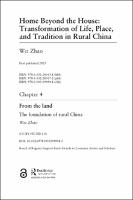Chapter 4 From the land
Proposal review
The foundation of rural China
Abstract
This chapter focuses on the multifaceted relationship between people and the land on which their families lived for generations. Summarizing this relationship as the place-bound relationship, this chapter examines the ways this place-bound relationship affected the meaning of home for people living in Yanxia. Vernacular place in rural China includes the system of settings where daily activities often take place outside the house. It also consists of highly socialized spaces built on social relations established through consanguineous coordinates, which in turn stabilize and sustain rural societies while strengthening attachment to place. Using this theoretical framework and drawing upon the ethnographic fieldwork, this chapter argues that the place-bound relationship in Yanxia supported the rural lifestyle, sustained social relationships and cultural performance, facilitated the construction of individual and collective identities, and imparted to local residents a sense of ownership of their home. In particular, the sense of ownership further attached the residents to the land, which, in turn, strengthened the place-bound relationship and sustained the meaning of home.
Keywords
China; Home; House; Life; Place; Rural; Tradition; TransformationDOI
10.4324/9781003294948-5ISBN
9781032280158, 9781032280172, 9781003294948Publisher
Taylor & FrancisPublisher website
https://taylorandfrancis.com/Publication date and place
2023Imprint
RoutledgeClassification
Architecture
Landscape architecture and design
Architecture: residential and domestic buildings


 Download
Download